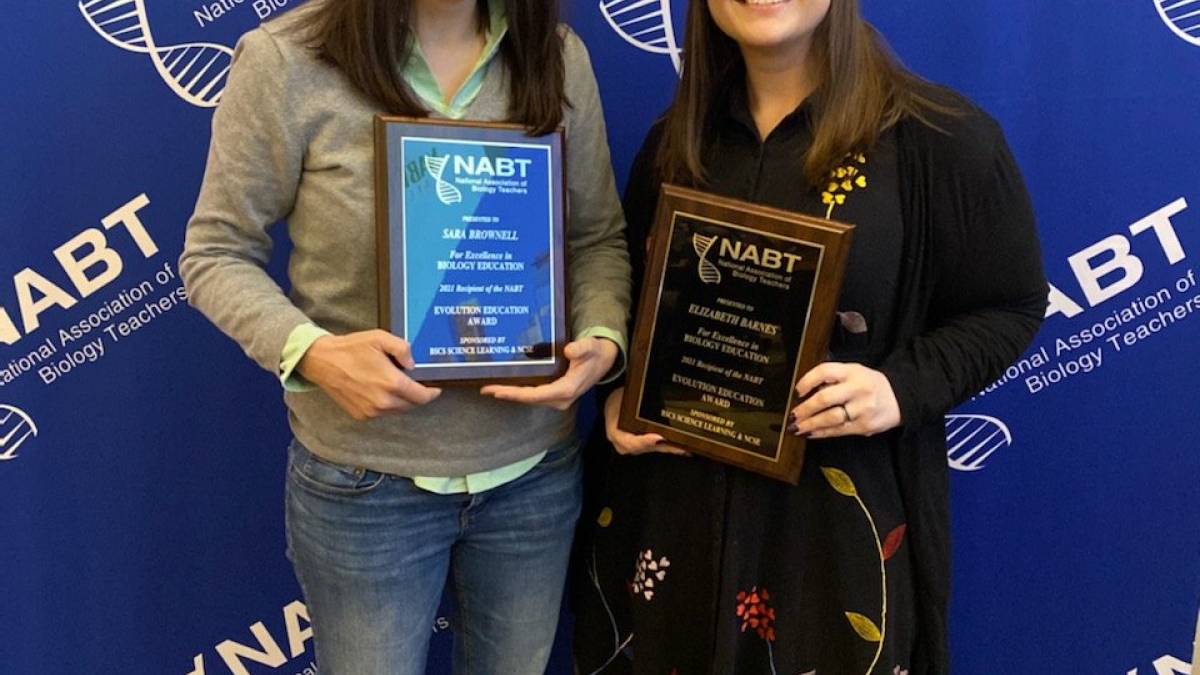ASU alumna, professor receive 2021 Evolution Education Award

Arizona State University School of Life Sciences Professor Sara Brownell (left) and alumna Elizabeth Barnes have been awarded the 2021 Evolution Education Award from the National Association of Biology Teachers. Photo courtesy of Sara Brownell
Arizona State University School of Life Sciences PhD alumna Elizabeth Barnes and Professor Sara Brownell have been awarded the 2021 Evolution Education Award from the National Association of Biology Teachers for their work overcoming the stigma that scientific teachings preclude religious beliefs.
The Evolution Education Award recognizes innovative educators who “promote the accurate understanding of biological evolution.” Only one award is administered each year, alternating annually between educators in higher education and K–12. The award is sponsored by the National Center for Science Education and the Biological Sciences Curriculum Study.
This award recognizes Barnes’ thesis that was conducted with her adviser, Brownell.
Their shared work advocates for a “call to use cultural competence” when teaching evolution, a core principle of biology that can present a difficult obstacle for some students.
“Most religious beliefs can be compatible with evolution,” Brownell said. “We encourage students to learn about evolution while also acknowledging that they may have religious beliefs and try to help them see how the two can be compatible.”
Brownell and Barnes have found that there are many simple strategies that can be used by educators to help students reduce perceived conflict between their religious beliefs and the teachings of biological evolution.
This can include acknowledging which questions science can and cannot answer. Where science attempts to answer questions that begin with “how,” religious teachings answer more theological questions that begin with “why.”
“Many students have misconceptions that one has to be an atheist to accept evolution, which means that we need to do a better job at highlighting that science is actually agnostic with respect to whether there is a God because it is outside of the bounds of science,” Brownell said.
Another technique is to include examples of notable scientists who also practice a religious faith in the coursework.
A prominent example is Francis Collins, who served as director of the National Institutes of Health and helped oversee the human genome project. Collins is a geneticist and a faithful Christian. He also founded BioLogos, an organization that promotes discussion between Christians and scientists about evolution.
Educators who hold religious beliefs and teach biology are encouraged to share this facet of their identity with their students.
Studies conducted by Brownell and Barnes have shown a cultural disconnect at the college level between educators, who are mostly secular, and a large majority of students who define themselves as religious.
Inclusive representation and strong role models can provide valuable support for students who may worry their religious identity excludes them from a path in STEM.
Educators like Barnes and Brownell are working to increase dialogue about this social stigma in the classrooms, and this award reflects the work they have accomplished to spark discussion and use culturally competent education at the college level.
"Much of our work is showing that the perception of conflict between religion and evolution is greater than the reality of conflict,” Barnes said. “However, students are often only exposed to how science and religion can conflict and are not given the opportunity to see the many ways in which they can coexist peacefully.
“If we are going to increase trust in science and scientists among the public and our students, then we argue that scientists will need to start finding ways to communicate how religion and science can coexist. I think our award reflects that the scientific community is starting to recognize this as well."
More Science and technology

ASU student researchers get early, hands-on experience in engineering research
Using computer science to aid endangered species reintroduction, enhance software engineering education and improve semiconductor…

ASU professor honored with prestigious award for being a cybersecurity trailblazer
At first, he thought it was a drill.On Sept. 11, 2001, Gail-Joon Ahn sat in a conference room in Fort Meade, Maryland.…

Training stellar students to secure semiconductors
In the wetlands of King’s Bay, Georgia, the sail of a nuclear-powered Trident II Submarine laden with sophisticated computer…